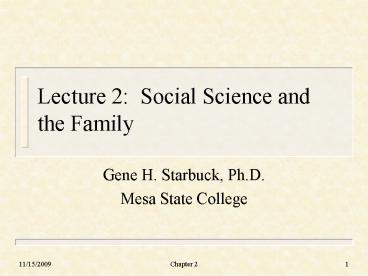Lecture 2: Social Science and the Family - PowerPoint PPT Presentation
1 / 18
Title:
Lecture 2: Social Science and the Family
Description:
Society, social, socialize, association. Greek logos, word (logo), reason (logic) logia, speak. ... Humans--not pigeons or dandelions (biology) or rocks (geology) ... – PowerPoint PPT presentation
Number of Views:116
Avg rating:3.0/5.0
Title: Lecture 2: Social Science and the Family
1
Lecture 2 Social Science and the Family
- Gene H. Starbuck, Ph.D.
- Mesa State College
2
Word Derivation Socio logy
- Latin socius, companionship societas,
fellowship. - Society, social, socialize, association
- Greek logos, word (logo), reason (logic)
logia, speak.
3
Definitions of Sociology
- The study of human society and social behavior.
-Eshleman - The systematic and objective study of society
and social behavior. -Popenoe - The systematic study of social behavior and
human groups. -Schaefer and Lamm
4
Working Definition of Sociology
- The Scientific Study of Humans in Groups
- Humans--not pigeons or dandelions (biology) or
rocks (geology) - Groups, not individuals (psychology)
- from Greek psukh? , breath, spirit or soul
- Sociology as Science
5
Assumptions of science
- 1. Objectivity (not subjectivity)
- Truth is in the thing being studied.
- 2. Replication--
- Two persons performing the same operations should
get the same result - 3. Falsifiability (testability).
- 4. Precision of definition and measurement.
6
Sociologists look for Regularities
- Repeated patterns of social events or traits.
- People in groups are predictable.
- Norms, roles, and institutions are all
regularities. - Discovery of regularities leads to discovery of
irregularities, and vice-versa.
7
Problems with Anecdotal Data
- Story told to prove a point.
- Not representative, difficult to falsify or
replicate, not objective. - Anecdotal data has legitimate purposes--
- Illustrate a concept or principle
- Provide a starting point for valid research.
8
Difference between social science and natural
science
- We are what we study.
- Use of personal experience in social science
- Webers verstehen
- Advantages
- Have prior knowledge
- Have subjective, as well as object knowledge
- Disadvantages
- Being value free and objective is more
difficult.
9
Levels of Social Analysis (Scripting Theory)
Macrosociology Structural-functional, Conflict
Theory
Institutions, Norms, Values, etc.
Socialization
Microsociology Symbolic-Interactionism
Individuals
10
Structural-Functional
- Studies inter-relationship of parts of a system
- assumes homogeneous interests
- finds traits, then asks How is that trait
functional to society? - Organismic analogy.
11
Social Conflict Theory
- Assumes heterogeneous interests among groups in
society - Where interests conflict, society is generally
constructed so that haves win. - Marxist conflict theory Economics is key
- Conflict Feminism gender system is key.
12
Sociocultural Evolutionary Theory
- Gerhard Linski
- Societies have particular ways of producing goods
and services (Modes of Production) - These change over time as technology builds.
- Modes of production and technology affect all
other aspects of society.
13
(No Transcript)
14
Symbolic Interactionism
- Assumes humans are actors.
- Studies the way meanings are created in human
interaction. - G. H. Mead Role taking Our actions are based
on our expectations about others reactions to
our imagined actions. - Goffman Dramaturgic Sociology.
- Garfinkel Ethnomethodology.
15
Social Exchange Theory
- Based on assumptions from economics.
- Assumes people are rational, attempt to maximize
rewards and minimize punishments - People have resources that can be exchanged for
other resources.
16
Developmental Theory
- Key concepts are stages, family life cycle, life
course, and developmental tasks.
17
Societal Script-- institutions, values, norms etc.
Individual Script--Socialization
Individual Script--Socialization
Mutual Scripts
Scenes
18
End 144lect2



























![Inclusive Practices for [Computer Science] Education PowerPoint PPT Presentation](https://s3.amazonaws.com/images.powershow.com/P1253036865GDxNJ.th0.jpg?_=20120217052)



